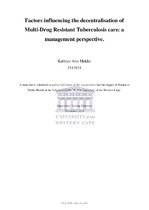| dc.contributor.advisor | Mathews, Verona | |
| dc.contributor.author | Mekler, Kathryn Ann | |
| dc.date.accessioned | 2019-06-07T11:46:54Z | |
| dc.date.available | 2019-06-07T11:46:54Z | |
| dc.date.issued | 2018 | |
| dc.identifier.uri | http://hdl.handle.net/11394/6866 | |
| dc.description | Master of Public Health - MPH | en_US |
| dc.description.abstract | Decentralisation of multi-drug resistant tuberculosis (MDR-TB) services has resulted in improved access to care, with community-based treatment of MDR-TB shown to be more effective than centralised hospital-based care. Furthermore, increasing bed shortages resulted in the National Department of Health establishing MDR-TB policy guidelines in 2011.
However, the extent to which this policy has been implemented by the decentralised MDR- TB sites and the factors influencing implementation of the policy from a management perspective were not well described.
The aim of this study was therefore to explore and compare the actual and ascribed roles and responsibilities of key management-level role players at the decentralised MDR-TB sites, and to explore the factors influencing implementation of the MDR-TB decentralisation policy (2011). | en_US |
| dc.language.iso | en | en_US |
| dc.publisher | University of the Western Cape | en_US |
| dc.subject | Multi-drug resistant tuberculosis | en_US |
| dc.subject | Decentralisation | en_US |
| dc.subject | Implementation | en_US |
| dc.subject | District health management team | en_US |
| dc.title | Factors influencing the decentralisation of Multi-Drug Resistant Tuberculosis care: A management perspective | en_US |
| dc.rights.holder | University of the Western Cape | en_US |

